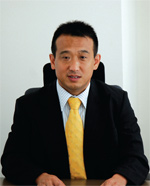IntaSect Communications: At the Crossroads - Yufeng Tan
Though IntaSect Communications is based in Japan, the company outsources its software development to China. CEO Yufeng Tan explains how his company is maximising the best of both countries.
Yufeng Tan set up software development company IntaSect Communications in Japan in 2000. Tan says the name IntaSect sums up where he sees himself and his business: at the intersection of Japan and China, and with his background and contacts, the company is certainly well placed to capitalise.
IntaSect Communications offers a broad portfolio of services that includes designing and developing financial services software and working with partners such as Toyota on some of its IT systems. It offers web server and web patrol services to clients and runs an affiliate advertising service. Its Japanese business employs 110 people in Tokyo, Osaka, Nagoya and Himeji, but through outsourcing software development to the Szechuan Province in China, and with an office in Beijing, the business employs another 500 people.
High-quality service
Tan says he first visited Szechuan in 1996 while working for another Japanese company and was immediately struck by the high quality of the services delivered. When the time came to expand his own business, he headed back to Szechuan.
‘There is something like 100 millon people in Szechuan, almost as many as in the whole of Japan,’ Tan says. ‘As a region, it is surrounded by mountains, meaning that on the whole the working population is stable and tends not to move from the province.’ For Tan this equates to a stable and reliable workforce.
In terms of managing that workforce, Tan says many Japanese companies make the mistake of sending out Japanese managers to run operations. Not only is this expensive in terms of housing allowances and resettlement costs, it is a method fraught with potential problems. He says unless the managers really understand the cultural differences and language, it is a mistake. He employs Chinese managers in China and Japanese managers in Japan.
Cultural differences
Tan says that no matter who is running operations in China, all companies must be aware of cultural differences in terms of the quality of work. ‘The Japanese have a long history of precision manufacturing processes and a reputation for attention to detail and finishing,’ he says. ‘Sometimes projects take a long time as a result.
In China, the attention to detail is less important than turning jobs around quickly. Something that might take ten years in Japan could take one year in China, and this can be unsettling for Japanese firms.’
What is important, Tan believes, is keeping on top of the detail and impressing onto the Chinese workers the importance of finishing and detail. Over time, he says, they will come to understand.
What is crucial when outsourcing to China is finding reliable and trustworthy partners – something Tan admits is easier said than done. He says Japanese people are traditionally cautious when entering into business partnerships and, when it comes to China, sometimes that is the right policy. ‘If Chinese businesses see a foreign company with money coming to the region, they will suddenly find they have many Chinese friends,’ Tan says.
He advises going to the country, or region, spending time there and developing relationships over time: perhaps a year, five years, or longer. ‘In China there is a saying,’ Tan says, ‘that you can smell if a person is trustworthy.’ Tan says many companies make the mistake when outsourcing of thinking they are shunting the boring or messy bit of the business off to a factory in China.
For Tan, it’s not about outsourcing, it’s about partnerships and about the Chinese employees being every bit as part of the business as the employees in Japan. Tan makes a point of getting the Chinese managers over to Japan to involve them in the software design process. Japanese managers are also encouraged to visit the sites in China and the arrangement works well. Tan says outsourcing has enabled his business to grow. ‘Without it, IntaSect Communications simply would not be where it is today,’ he says.

